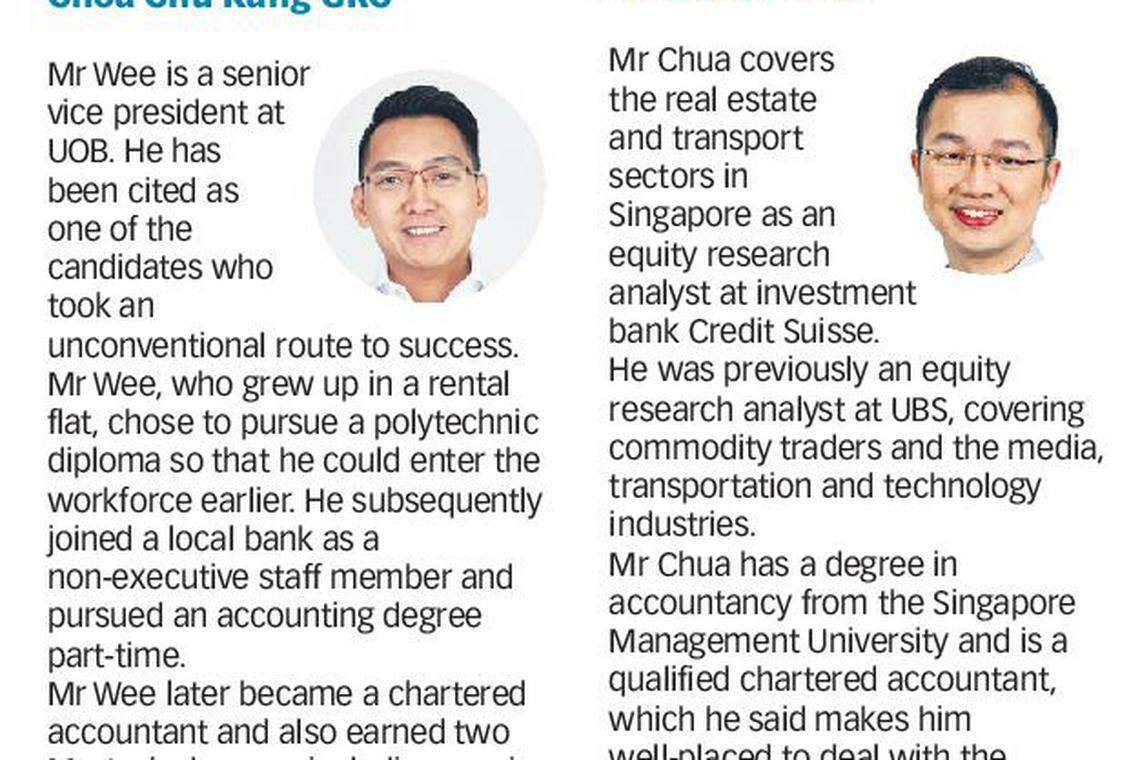Private leaders in the public space: More business voices needed in politics
Candidates with business background, from PAP and opposition, can help tackle economic challenges posed by Covid-19


Singapore
THE notable presence of private-sector leaders among first-time candidates in General Election 2020 is encouraging, especially given that Singapore will have to tackle some of its biggest economic challenges since its founding, business observers told The Business Times.
But going forward, there is still room for better representation in some segments, such as SMEs, among political aspirants, they noted.
Out of the 26 new candidates for the People's Action Party (PAP), 17 are from the private sector. Notable business figures include former IHH Healthcare chief executive Dr Tan See Leng and DBS head of group audit Derrick Goh.
Other private sector candidates from the PAP include those from the professional services, such as TSMP lawyer Nadia Ahmad Samdin, Boston Consulting Group partner Mariam Jaafar and from the tech sector, LinkedIn's head of public policy and economics Alvin Tan.
The opposition parties are also fielding several candidates with a business background. There is Jamus Lim of the Workers' Party (WP), an associate professor of economics at
SEE ALSO
A NEWSLETTER FOR YOU

SGSME
Get updates on Singapore's SME community, along with profiles, news and tips.
ESSEC Business School and chief economist at investment management firm Thirdrock Group, with work experience at Abu Dhabi Investment Authority and the World Bank. Others include former OCBC Securities managing director Leong Mun Wai of the Progress Singapore Party (PSP), and Credit Suisse equity analyst Louis Chua of WP.
Ho Meng Kit, chief executive of the Singapore Business Federation (SBF), welcomed the "good mix" of private sector candidates, from multinational corporations and SMEs to social enterprises. These candidates could contribute to the debate over how Singapore should navigate the challenges that the Covid-19 pandemic has thrown up, he said.
"Post-Covid-19, Singapore will have to strengthen its social compact. Businesses will have additional responsibilities to society beyond providing good jobs. Society will expect businesses to care more for our environment, provide sustainable employment for lower-wage workers, mature workers and the disadvantaged," said Mr Ho.
Kurt Wee, president of the Association for Small and Medium Enterprises (ASME), echoed this sentiment. "It is good to have sufficient representation from the business sector; I think it's very important... Not necessarily people in high positions, but also people who have really developed themselves in that profession," he said.
Business figures among the PAP new faces tend to be those who have modest working class beginnings, which emphasises how they were beneficiaries of the meritocratic system and enjoyed intergenerational social mobility, noted Gillian Koh, deputy director of research at the Institute of Policy Studies (IPS).
"For that reason, they say they are committed to strengthening a system to ensure that this social dynamism is maintained," she said.
In their midst are also "social innovators and active citizens". Dr Koh cited Ms Jaafar and fellow PAP candidate Edward Chia, the co-founder of Timbre Group, as examples of business leaders equipped with some experience of community service or public engagement.
There is also more representation from businesses with a strong social focus, with PAP candidates such as Yeo Wan Ling, chief executive of social enterprise Caregiver Asia, and Rachel Ong, who helms learning and consulting firm Rohei.
Opposition ranks also feature business backgrounds. Ms Koh said: "It is important that they lend a greater measure of pragmatism to the cause so that their political activism is viewed as credible and actionable."
For instance, she pointed out how Workers' Party candidate Muhammad Azhar, a Grab driver and small business owner, has spoken out about equal employment opportunities.
The PSP's Mr Leong, a finance industry veteran with over 30 years of investment and management experience, has expressed a conviction to contribute to the development of Singapore's economic strategy.

Still, while there is more representation from the private sector, many of the business figures being fielded are from government-linked companies or multinational corporations, noted Nicholas Fang, a former Nominated Member of Parliament.
He highlighted the importance of having political representatives who understand the SME landscape, given that these companies are a key driver of the economy and job-creation in Singapore, but are facing the most severe challenges.
"Entrepreneurs who have created and built their own companies will also bring in fresh perspectives and insight into what it will take to build future Singapore corporate champions. Their instincts and appetite for risk would be quite different from civil servants, for example," said Mr Fang, who runs four companies in the consulting and research space.
"Such potential candidates would be able to bring in more diverse views which would strengthen the process of policy-making and ensure that future policies are robust and relevant to the society and economy of the day," Mr Fang added.
Despite the noticeable effort of political parties, especially the ruling PAP, to attract more private sector individuals, there is a relative absence of stand-out private sector leaders in the contest, said Singapore Management University law professor Eugene Tan.
The likes of former Finance Minister Richard Hu remain few and far between, and the dearth of candidates at these levels raises the question of why it is difficult to draw a good supply of corporate big-wigs into politics, said Prof Tan. Their perception of how the government operates, and how policy making is done at the highest levels, may give pause to private sector leaders thinking about entering politics, he added.
Recent events have also demonstrated the intense public attention that a political newcomer can face. The withdrawal of the PAP's Ivan Lim, a general manager with Keppel Offshore and Marine, under intense public scrutiny, could deter more from stepping forward. The burden of the public glare is not something that private sector leaders - often judged on the basis of business performance - are necessarily prepared for, said observers.
Senior public servants, on the other hand, are more likely to be accustomed to certain expectations of public exposure. It is something leaders in the private sector may not readily welcome.
Said Mr Fang: "As politics continues to mature and evolve in Singapore, it will be necessary to ensure that those with aspirations to elected office understand the requirements and expectations, and develop the ethos and skill sets to succeed before they enter the fray."
READ MORE:
KEYWORDS IN THIS ARTICLE
BT is now on Telegram!
For daily updates on weekdays and specially selected content for the weekend. Subscribe to t.me/BizTimes
International
US expects to finalise new Aukus trade exemptions in next 120 days
IMF concerned about debt, fiscal challenges facing low-income countries
Bank of Japan’s Ueda says ‘very likely’ to hike rates if inflation keeps rising
Colombian fund managers eye US$750 million fee bonanza after senators tweak pension bill
Fed survey cites inflation, US election as key financial stability risks
Oil prices steady after Iran plays down reported Israeli attack
